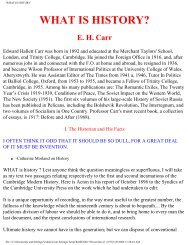The bronze age and the Celtic world - Universal History Library
The bronze age and the Celtic world - Universal History Library
The bronze age and the Celtic world - Universal History Library
Create successful ePaper yourself
Turn your PDF publications into a flip-book with our unique Google optimized e-Paper software.
THE ARYAN CRADLE 137<br />
<strong>The</strong> use made of <strong>the</strong> Aryan Nordic equation by German political propag<strong>and</strong>ists has<br />
inclined, French <strong>and</strong>, to some extent, English writers, to reject this view. This objection<br />
has been in a large measure due to misunderst<strong>and</strong>ings, <strong>and</strong> in any case it is unscientific to<br />
allow national <strong>and</strong> poUtical prejudices to influence our opinions on such questions.<br />
If, <strong>the</strong>n, we agree with Penka that <strong>the</strong>re must have been an original Aryan race,<br />
or, as we shall call <strong>the</strong>m, Wiros, it is important to ascertain what part of <strong>the</strong> <strong>world</strong> it was,<br />
from which <strong>the</strong>se langu<strong>age</strong>s spread to Irel<strong>and</strong> <strong>and</strong> Bengal. This is <strong>the</strong> problem of<br />
<strong>the</strong> Aryan cradle.<br />
In <strong>the</strong> early days of <strong>the</strong> hypo<strong>the</strong>sis students noted that Sanskrit was <strong>the</strong> most<br />
archaic of <strong>the</strong> langu<strong>age</strong>s, <strong>and</strong> forgetting that <strong>the</strong> Vedic hymns were composed 1000 or<br />
1500 B.C., while <strong>the</strong> earliest Greek literature dated from 800 or 900 B.C., <strong>the</strong>re was a<br />
tendency to derive <strong>the</strong> whole group from North India," Subsequently, when <strong>the</strong> close<br />
connection between Sanskrit <strong>and</strong> Zend, <strong>the</strong> ancient Persian tongue, was recognised,<br />
<strong>and</strong> it was realised that <strong>the</strong> Vedic folk were recent arrivals in <strong>the</strong> Punjab when <strong>the</strong> Vedic<br />
hjrnins were being composed, <strong>the</strong> Aryan cradle was removed to <strong>the</strong> region watered by<br />
<strong>the</strong> Oxus <strong>and</strong> <strong>the</strong> Jaxartes, <strong>and</strong> <strong>the</strong> slopes of <strong>the</strong> Hindu Kush."<br />
Here <strong>the</strong> cradle remained for a long time. Pott, hypnotised by his aphorism ex<br />
oriente lux, drew a wonderful picture of <strong>the</strong> westward advance of <strong>the</strong> Wiros from <strong>the</strong>ir<br />
eastern home. O<strong>the</strong>rs filled in, largely from <strong>the</strong>ir own imaginations, <strong>the</strong> remaining<br />
details. And so we get <strong>the</strong> mid-nineteenth century view of <strong>the</strong>se Aryan super-men,<br />
with a langu<strong>age</strong> containing potentialities of all that is fine in literature, with a social<br />
organisation <strong>and</strong> morality which was to reform benighted Europe, worshipping deities<br />
which were <strong>the</strong> products ei<strong>the</strong>r of solar or chthonic myths or of diseases of langu<strong>age</strong>,<br />
setting forth from <strong>the</strong> western slopes of <strong>the</strong> Himalayan massif, urged on " by an<br />
irresistible impulse " towards <strong>the</strong> setting sun, migrating westward <strong>and</strong> ever westward,<br />
canying <strong>the</strong>ir wives <strong>and</strong> famihes in <strong>the</strong> famous Aryan cart provided for <strong>the</strong>m by a<br />
distinguished anthropologist. '^ Such was <strong>the</strong> view imanimously held by all Europe,<br />
<strong>and</strong> which figures still in too many text-books. One man only was left crying in <strong>the</strong><br />
wilderness, or at least in <strong>the</strong> steppe, <strong>and</strong> he was an EngUshman. As Hehn'* wrote in 1874,<br />
" Adelung {1806-17) " ^- '^ Tylor (1881) 79-82.<br />
« Pott (1840) 19. '4 Hehn (1874) quoted by Taylor (1889) 23.







